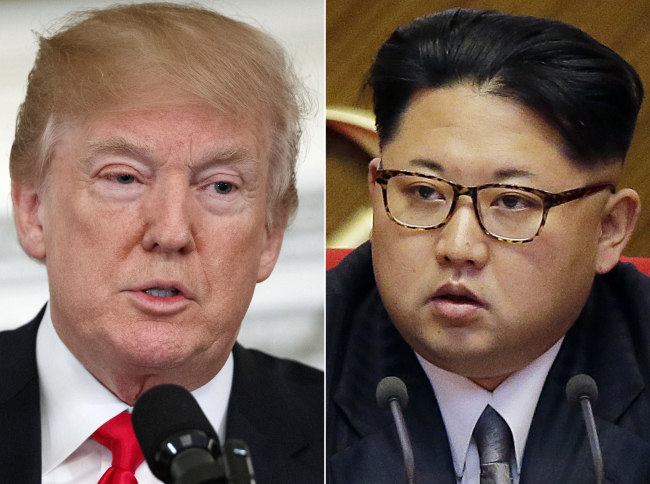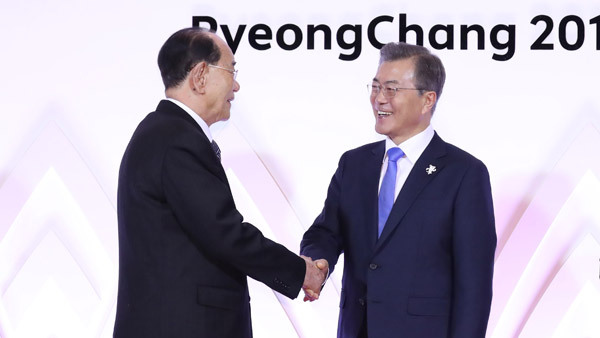With North Korea and the United States agreeing to hold a historic summit on North Korea‘s nuclear program, South Korea is campaigning to rally regional stakeholders’ support for what it sees as an ultimate opportunity to resolve the decadeslong security challenge.
National Security advisor Chung Eui-yong and National Intelligence Service chief Suh Hoon returned home Sunday after wrapping up their two-day visit to Washington, DC, during which they relayed North Korean leader Kim Jong-un’s message, including an invitation for a summit, to US President Donald Trump. The summit is scheduled to take place by May.
With the messages from both Washington and Pyongyang, South Korean envoys are to head to Tokyo, Beijing and Moscow this week. Suh will depart for Japan Monday on a two-day visit, while Chung will leave Monday to visit China and Russia. Whether Chung will meet with the Chinese and Russian leaders has not been confirmed, the presidential Blue House said.
“I’d like to pay my utmost respects to President Moon Jae-in and President Trump’s strong resolve to promptly achieve the goal of denuclearization and establish peace on the Korean Peninsula,” Chung said. “We also appreciate North Korean leader Kim’s courageous decision.”
 |
US President Donald Trump and North Korea`s leader Kim Jong-un. Yonhap |
A senior presidential official told reporters that Washington and Pyongyang will communicate with each other directly in the run-up to the summit, while the working-level talks -- including those concerning venue and agenda -- will be meditated by South Korea.
Among the likely venue for the US-North Korea summit is the truce village of Panmunjeom located in the heavily-fortified demilitarized zone, where the two Koreas are to hold the third inter-Korean summit in April, the official said under the condition of anonymity.
Other places in neutral countries have emerged as possible locations for the high-stakes summit. Among them are Geneva, Switzerland as well as Sweden, which has offered to help the US-North Korea talk.
“Panmunjeom is one of the strong candidates, with other places such as Switzerland, Sweden and Jeju island gaining attention,” said the presidential official. “Of course we could offer our view, but it’s up to North Korea and the US.”
The South Korean envoys‘ trips to China, Russia and Japan are largely designed to rally the neighboring countries’ support for the historic summit and assure them that all concerned parties are involved in what will be a game changer for security landscape in the region.
Concerns have been raised that the latest developments had proceeded without full consultation with a US key ally and neighboring countries. Since Trump’s acceptance of the meeting with the North, worries have grown particularly in Japan that it has been sidelined while South Korea managed to talk President Trump out of bellicose rhetoric and into a peaceful gesture to the North.
Although Japan’s Prime Minister Shinzo Abe publicly reiterated watertight coordination between Tokyo and Washington, the fear persists that the outcome of the talks will fall short of Japan’s insistence that North Korea should make meaningful progress on its nuclear program first and that that should be a precondition for any nuclear talks. Abe and Trump have scheduled a summit in Washington in April.
“Now that the situation has changed, I think Suh will tell the Japanese that we should get rid of our doubts about North Korea and cooperate with each other to build a peace regime in Northeast Asia,” the presidential official said.
The South Korean envoy’s scheduled trip in the region also raises the prospect of resuming six-party talks that have been stalled since 2008. Led by China, the multilateral talks also involve the two Koreas, the US, Japan and Russia.
Since the collapse of the six-party talks, China and Russia have called for the resumption of the multilateral dialogue platform. Worried about being sidelined, Japan is expected to lean toward the six-party talks rather than a US-North Korea bilateral dialogue.
Asked about the resumption of the talks, the presidential official said “anything is possible” given that the latest development took place in an “unprecedented and unexpected” way. South Korea’s Foreign Ministry said Thursday that six-party talks is a still “viable” platform.
 |
South Korea`s President Moon Jae-in shakes hands with North Korea`s nominal head of state Kim Young-nam. Yonhap |
Since coming into office in May last year with a pledge to engage with North Korea, President Moon Jae-in has argued for South Korea to be “in a driving seat” on inter-Korean issues and has taken up a meditating role between Pyongyang and Washington.
Over the past 10 months, Moon has met with Trump three times and held more than 10 telephone calls. Moon has delivered the idea that without direct US-North Korea talks, progress on inter-Korean relations would have a limited impact.
Such efforts culminated with Moon publicly giving credit to Trump for bringing about the inter-Korean talks in January when the North’s leader Kim announced his decision to participate in the PyeongChang Winter Olympics.
“President Moon of South Korea said without Donald Trump the Olympics would have been a total failure,” said Trump at a rally in Pennsylvania on Saturday. “It‘s a little hard to sell tickets when you think you’re going to be nuked.”
By Yeo Jun-suk(
jasonyeo@heraldcorp.com)









